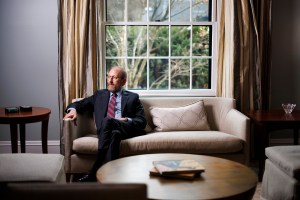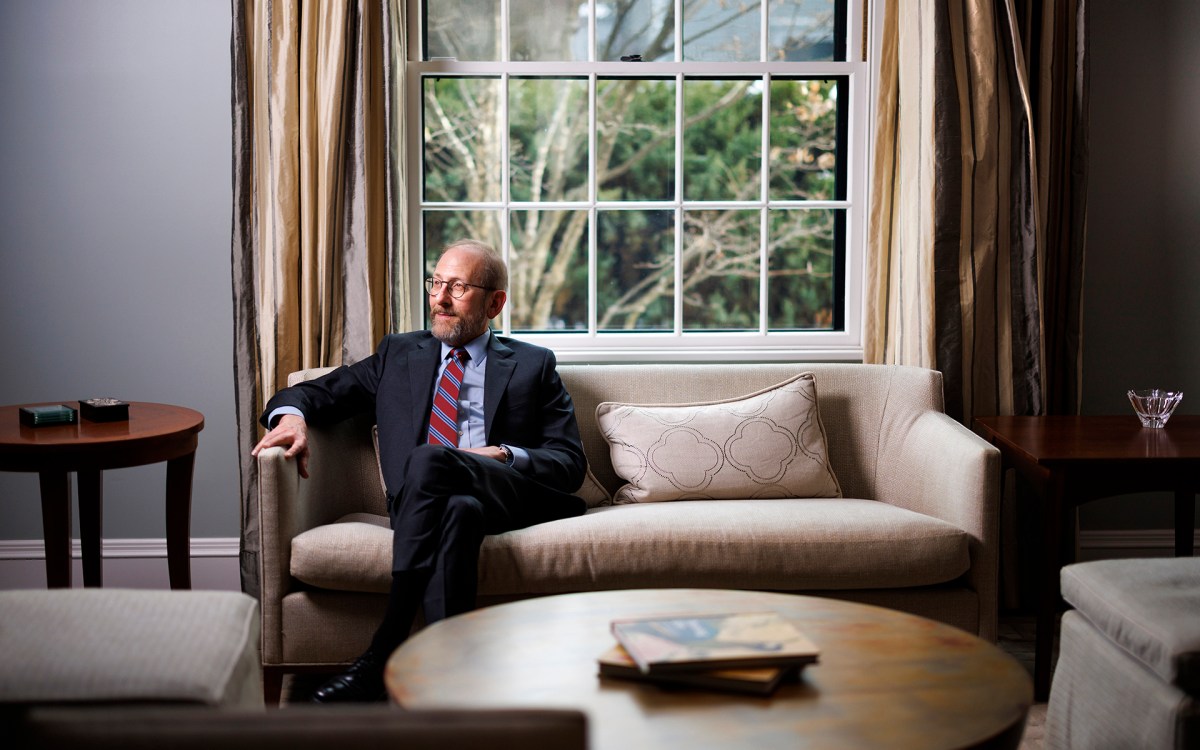Du Bois Institute announces new fellows
Henry Louis Gates Jr., Alphonse Fletcher University Professor and director of Harvard’s W.E.B. Du Bois Institute for African and African American Research, has announced the appointment of 18 new institute fellows for the 2008-09 academic year.
“Our fellows this year are working on the frontiers of African and African-American studies,” said Gates. “With studies of the African-American communities in the American West and Midwest, Renaissance European art, and the beaches and swimming pools in the American South, to name just a few points of interest, the Du Bois Fellows are pushing at the boundaries of the way we have traditionally understood the field. Our fellows — from North and South America, Europe, and Africa this year — demonstrate the vast reach of the discipline, and each stands to make a great and lasting contribution to the field of African and African American Studies.”
Since its creation in 1975, the Du Bois Institute has annually appointed scholars who conduct individual research for a period of up to one academic year in a variety of fields within African and African American Studies. The Institute accepts established and emerging scholars from both the humanities and social sciences. Fellows conduct their research by using resources from Harvard’s extensive library system as well as from the institute’s research projects, including the Black Potomac Valley Project, the Black Patriots Project, the Dictionary of African Biography, the African Art Database, the Image of the Black in Western Art Research and Photo Archive, the Timbuktu Library Project, the African AIDS Initiative International, and the Working Group on Environmental Justice. Du Bois Fellows also participate in the varied activities of the institute including public conferences, lectures, readings, and forums.
The Du Bois Fellows and their research projects are as follows
Erin Royston Battat is a doctoral candidate in the history of American civilization at Harvard University. Her research interests include migration and immigration, social movements and protest literature, the intersections of race and class, and the American West. Battat is in residence during spring 2009 as Sheila Biddle Ford Foundation Fellow. Her research project is called “‘Ain’t Got No Home’: Race and American Migration Narratives in the Depression Era.”
David Bindman was the Durning-Lawrence Professor of the History of Art at University College London. He is a scholar of 18th century British art, and over the past several years his scholarly interest has turned to the representation of non-Europeans in Western art. As a Sheila Biddle Ford Foundation Fellow this fall, his project is the preparation for publication of the last three volumes of the Image of the Black in Western Art series.
Anna-Lisa Cox is an independent scholar in residence as a Sheila Biddle Ford Foundation Fellow in spring 2009. Her research interest is in the history of race relations in the 19th century Midwest. As a fellow at the Newberry Library from 2002 to 2006, Cox was the director of the rural history seminar program. She is presently at work on a book titled “Founding Freedom: The Antebellum Free Black Diaspora and the Creation of Communities of Equality on the American Frontier.”
Vagner Gonçalves da Silva is professor of anthropology at the Universidade de Sao Paulo, Brazil. His research interests include religious intolerance, ethnography viewed by observers, and Afro-Brazilian religion and arts. As a Sheila Biddle Ford Foundation Fellow in residence this fall, he is working on a study called “Afro-Brazilian Religions and National Culture — An Ethnography in Hypermedia.”
Abdoulaye Gueye is associate professor of sociology and anthropology at the University of Ottawa. Educated at the École des Hautes Études en Sciences Sociales and the Université Sorbonne in Paris, Gueye studies globalization, international development, race studies, and the sociology of knowledge. He is in residence as a Sheila Biddle Ford Foundation Fellow for the full academic year, where he is at work on a project titled “The Black Movement in Contemporary France.”
Andrew Kahrl is an assistant professor of history at Marquette University in residence for the full academic year as a Sheila Biddle Ford Foundation Fellow. He received his Ph.D. in history from Indiana University in 2008. Primarily a scholar of the American South, he also served as a research consultant for the Liberian Collections Project at Indiana University. He is at work on a manuscript based on his dissertation, “On the Beach: Race, Class, and the Politics of Leisure in the Jim Crow South.”
Paul H.D. Kaplan is professor of art history at the State University of New York, Purchase College. He specializes in the political iconography of Venetian Renaissance art, with emphasis on the works of Giorgione and Veronese, and is the author of the 1985 book “The Rise of the Black Magus in Western Art.” With Fellow colleague David Bindman, the general editor of volume 3 of The Image of the Black in Western Art series, Kaplan is preparing a comprehensive treatment of the social position and representation of black Africans in Venetian culture. He is in residence this fall as a Sheila Biddle Ford Foundation Fellow, and his project is titled “European Images of Black Africans, 500-1700.”
Hope Lewis is professor of law at Northeastern University, where she is co-founder of the Program on Human Rights and the Global Economy. She specializes in international law, including human rights, and is the co-editor of the first U.S. human rights textbook to focus primarily on globalization and economic, social, and cultural rights. As a Sheila Biddle Ford Foundation Fellow this fall, she will work on a new manuscript, “Black Without Borders: Transnational Migration, Human Rights, and Race in the United States.”
Joanna Lipper is a filmmaker and author of an acclaimed book about teen parenthood, “Growing Up Fast.” A graduate of Harvard College, she is the head of the film production company Sea Wall Entertainment. While in residence as a Sheila Biddle Ford Foundation Fellow this academic year, she will work on a film adaptation of Roger King’s novel, “A Girl from Zanzibar.”
David Luis-Brown is assistant professor of English at the University of Miami. He is a visiting scholar in the Department of English and American Literature and Language at Harvard this fall, and will be in residence as a Sheila Biddle Ford Foundation Fellow in the spring. A scholar of discourses of decolonization, freedom, nationalism, and race in Cuba, Mexico, and the United States, and of African diasporic literature and culture, he is currently at work on his second book, “Blazing at Midnight: Slave Rebellion and Social Identity in U.S. and Cuban Culture.”
Mbulungeni Madiba is associate professor and coordinator of the Multilingualism Education Project in the Centre for Higher Education Development at the University of Cape Town (UCT). His research is in the areas of language policies, language planning, politics of language, multilingualism, and corpus linguistics. As the Du Bois Institute Mandela Fellow in the spring, he will work on a study of the theoretical frameworks and methodological challenges of implementing multilingualism in teaching and learning programs in higher education, stemming from his work at UCT.
Jennifer Nash is a doctoral candidate in the Department of African and African American Studies at Harvard University. She received her A.B. in women’s studies at Harvard College in 2001, and her J.D. from Harvard Law School in 2004. As a Sheila Biddle Ford Foundation Fellow in residence for the full academic year, she will work on her dissertation, “The Black Body in Ecstasy: Reading Race, Reading Pornography.”
David Ogungbile is senior lecturer in comparative religions and African religions at Obafemi Awolowo University in Ile-Ife, Nigeria. He specializes in the practice, expression, and dynamics of indigenous religions, Islam, and Christianity in Africa. Ogungbile is in residence as a Sheila Biddle Ford Foundation Fellow for the full academic year and is at work on his manuscript, “Divine Manifestation and Human Creativity: Cultural Hermeneutics of Myth, Ritual and Identity Among Osogbo-Yoruba People of Nigeria.”
Barbara Rodriguez is an independent scholar specializing in African-American literature, with a focus on autobiography and the tradition of the slave narrative in American literature and art in the 18th, 19th, and 20th centuries. Rodriguez, who has previously held the Du Bois Fellowship, is in residence for the full academic year, and is working on a new project, “Representations of Slavery: Texas, Mexico, and Race in the 1830s and 1840s.”
E. (Epifanio) San Juan Jr. is professor emeritus of English, comparative literature, and ethnic studies at the University of Connecticut. A specialist in U.S. imperialism, colonialism in the Philippines, and race and cultural studies, he will be in residence as a Sheila Biddle Ford Foundation Fellow in the spring. His current project is called “The African American Involvement in the U.S. Conquest of the Philippines (1899-1902).”
J. Mira Seo is assistant professor of classical studies and comparative literature at the University of Michigan. She specializes in Latin epic and post-Ovidian Latin poetry. As a Sheila Biddle Ford Foundation Fellow in residence in spring 2009, she is completing her translation and commentary on the works of Juan Latino and is beginning research for a monograph on Latino’s library and the classics in ecclesiastical education in 16th century Granada. Seo’s project is titled “The Complete Works of Juan Latino, the First Black Poet, Translated and Edited with Literary and Historical Notes.”
Faith Smith is associate professor of African and Afro-American studies and English and American literature at Brandeis University, where she also holds appointments in the programs in Latin American and Latino Studies and Women’s and Gender Studies. Her research interests include colonial and postcolonial intellectual movements, Black Atlantic studies, and Victorian intellectual life. As a fellow in residence for the full academic year, she will work on her current book project, “Whose Modern? Caribbean Cultural and Intellectual Formation, 1880-1915.”
Jeremy Wanderer is senior lecturer in philosophy at Cape Town University. A Mandela Fellow in residence this fall, his research focuses on the philosophy of mind, philosophy of language, epistemology, and philosophical pedagogy. His current project is called “Can There Be a Whither Without a Whence? On the Very Idea of a Philosophical Tradition.”
The W.E.B. Du Bois Institute is the oldest research center of its kind, and has supported the scholarly development of more than 250 alumni, including such leading figures in the field as Wole Soyinka, the late St. Clair Drake, Nell Irvin Painter, Cornel West, and the late Dorothy Porter Wesley. Numerous scholars who came to the institute as junior faculty members are now tenured members of African American studies and other departments in the United States, Europe, Latin America, and Africa.




